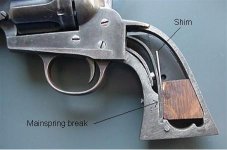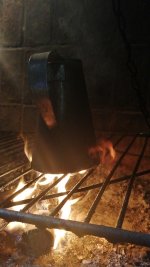I generally drown my percussion revolvers while cleaning after a day at the range, but the cylinders have all been fired so no concern about wetting loaded chambers.
After a cowboy fires a single shot from his percussion revolver, did he clean the empty chamber before reloading? Was it a quick wipe of the chamber with a damp rag on a stick?
After a cowboy fires a single shot from his percussion revolver, did he clean the empty chamber before reloading? Was it a quick wipe of the chamber with a damp rag on a stick?


